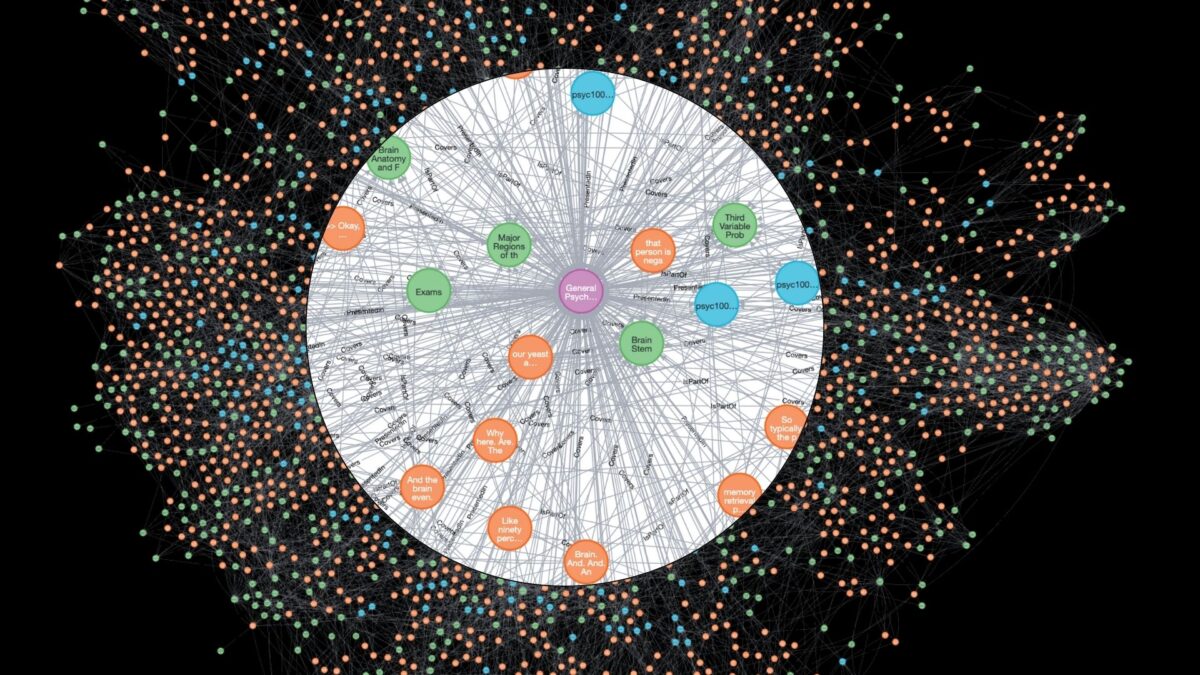It’s a new school year, and AI continues to work its way into classrooms.
At the University of Delaware (UD), the new Study AiDE tool allows faculty to access a collection of audio and visuals captured from lectures over the last 20 years. It’s made it easier for students to create flashcards and other study tools while putting a cache of old material to good use.
“We have hundreds of thousands of videos with faculty members who have taught these courses,” Jevonia “Nova” Harris, senior software engineer at UD, told Technical.ly. “So when AI started to become more accessible, we thought, what can we do in order to allow faculty to use AI with the content that they already have?”
There was a time, if brief, when generative AI tools that can write essays or answer questions in a complex way, were seen as too disruptive to be used in the classroom after ChatGPT launched to the public in November 2022. Out of fear of AI-fueled cheating and plagiarism, some school districts, including in New York City, outright banned it.
By the summer of 2023, the tide began to turn, as educators who were versed in AI worked to dial down the fear. AI, they said, could be used as a new kind of teaching tool that can help students learn more effectively rather than copy and paste.
Members of UD’s Academic Technology Services team, from left to right: Joe Naccarato, Rafi Turitz-Sweifach, Jevonia (Nova) Harris, Kelly Cross, Erin Sicuranza and Ryan Eagan.
Taking the heavy lift of study guides off of faculty’s desks
Not everyone initially saw the potential value of generative AI for students initially.
Erin Sicuranza, director of UD’s Academic Technology Services, said she previously thought the lecture collection was less than useful.
“This is where I eat a little bit of crow,” Sicuranza said. “Because for a long time as an instructional designer, I was like, why are we saving 15 years worth of whole videos? Students shouldn’t be watching videos from 15 years ago.”
That changed after Harris’s idea, though. With Study AiDE, students don’t have to go back and watch old, possibly dated, lecture videos. Instead, the instructor runs transcripts of their lectures and runs them through AI, asking it to give them the topics, the subtopics and the definitions it finds in them. Harris compares it to giving power tools to a master craftsperson.
After that information has been pulled, there is a human oversight stage where the faculty member reviews the information pulled from the AI results, rejecting anything that is incorrect or outdated.
“Once that is complete, we store all of those topics and subtopics and connect it to the transcripts — big chunks of content,” Harris said.
The result is what the team calls a “knowledge graph of data” that has been approved by the faculty members. Their students can then have study aids, such as digital flashcards, created by generative AI using that data.
Though it’s generative AI, it does not use the chat feature often associated with generative tools like ChatGPT. Other study aids it might create include case studies, outlines and comparative summaries created by faculty and made available to students through edtech platform Canvas, its learning management system.
The project shows that even older recordings and videos can be of use down the line — if you hold on to them.
Human consent guides the project’s next steps
At this point, just a few faculty members are using it as a pilot this semester.
“We’re starting small, but we’ve got big plans for rolling this out beyond single classes into departments and programs and colleges and one day the university,” said Sicuranza.
The modular system they’ve built can scale, as long as they have the right resources in place.
They also adhere to ethical guidelines. The team makes sure to get consent from the faculty members involved every step of the way, and doesn’t create study guides with any outside sources.
“That was one of the very first things that our team produced,” Sicuranza said. “We are stewards of a lot of course content, and we don’t take that responsibility lightly.”
Ultimately, Study AiDE is meant to increase accessibility for students, where they can get the kind of study tools that work best for them.
“We’re being thoughtful in how we’re designing this,” Harris said. “Because one of the things that we’re really looking at is giving advocacy back to the learner.”
Before you go...
Please consider supporting Technical.ly to keep our independent journalism strong. Unlike most business-focused media outlets, we don’t have a paywall. Instead, we count on your personal and organizational support.
Join our growing Slack community
Join 5,000 tech professionals and entrepreneurs in our community Slack today!

The person charged in the UnitedHealthcare CEO shooting had a ton of tech connections

From rejection to innovation: How I built a tool to beat AI hiring algorithms at their own game

Where are the country’s most vibrant tech and startup communities?



